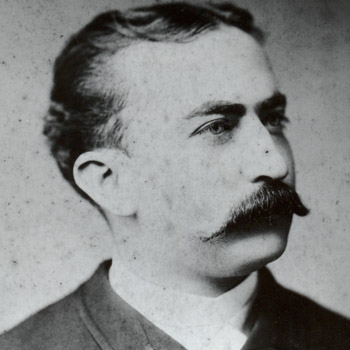The young lawyer who revived freedom (1886-1895)
When, at age 27, Nicholas Warlosten founded the Externado, he was already riddled with scars: at 17, he joined the �Batall�n Libres de Colombia� (Free battalion of Colombia), to defend the radical education project, attacked by the Conservatives under the slogan "down with schools." Later, he sustained a leg injury inflicted by a political opponent, against the ideas expressed by the young man in the newspaper La Reivindicaci�n, in Santander.

In 1885 he threw himself to defending the radicalism achievements, threatened by the Government of Rafael Núñez. In Honda, Pinzón is taken prisoner and confined in a narrow dungeon.
He obtained his Law degree from the Universidad Nacional and became a Mason at the same time as liberal leader Rafael Uribe Uribe. As a result, the more retrograde sectors accused him of being an atheist and a sinner.
However, despite everything, Pinzón was not a warrior; in his writings, he avows he participated in the war because he had no choice.
«I have never felt enough enthusiasm for war to be dazzled by the glare of a victorious sword,» he wrote in El Liberal.
His calling was education. Thus, when all was lost, he wanted to establish a school, a habitat for liberal ideas. A secular education, respectful of those with religious beliefs, regardless of their nature, and protective of those who did not have any. His formula was the same for political ideas.
As a diplomat in Europe, he had seen, first-hand, the most modern higher education centers in the continent, which had done away with the boarding school system, considering it inappropriate for the development of the students personality. Hence, the name Externado, given to the University he founded.
In the European schools, texts by the great thinkers of the 19th century were used: Spencer, Bentham, Suart Mil, among others, prohibited in Colombia during the Regeneration period and rescued by Pinzón for the Externado Chairs, despite the censorship imposed by the ecclesiastical authorities that held power over education.
The University functioned in the three rooms the founder had leased thanks to a loan from his father, and supported by the radicals, including the former Presidents of the United States of Colombia, Santiago Perez, Froilán Largacha, and Salvador Camacho Roldán.
Nicolás Pinzón was at the head of the institution for 10 difficult years, experiencing economic hardship and persecution from the Government that went as far as besieging the institution with security forces.
His death coincided with the closing of the first Externado.

